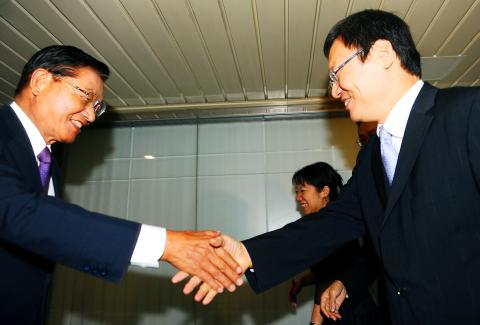Straits Exchange Foundation (SEF) Chairman Chiang Pin-kung (江丙坤) yesterday pledged to continue cross-strait negotiations under the principle of the so-called “1992 consensus” as he was re-elected to serve another three-year term.
Chiang, re-elected by the foundation’s new board of directors, promoted the government’s efforts in resuming cross-strait talks since President Ma Ying-jeou (馬英九) took office three years ago and said Taiwan and China would continue to work together and seek peace across the Taiwan Strait.
“I had called for the resumption of cross-strait negotiations and the long-term development of peaceful cross-strait relations when I first took over as chairman in 2008 and now I can proudly say we have made great achievements in cross-strait ties,” Chiang said.

Photo: Chang Chia-ming, Taipei Times
Since 2008, the foundation and China’s Association for Relations Across the Taiwan Straits have conducted seven rounds of negotiations and signed 16 agreements, including the -Economic Cooperation Framework Agreement signed last year.
Chiang yesterday said the “1992 consensus,” which refers to what the Chinese Nationalist Party (KMT) says is a mutual understanding between the two sides of the Strait that there is only one China, with each side free to interpret what that means, has improved cross-strait relations in recent years and would continue to serve as a solid foundation for future cross-strait talks.
Former National Security Council secretary-general Su Chi (蘇起), who came up with the term “1992 consensus” when he served as Mainland Affairs Council minister in 2000, was appointed as a board member yesterday, sparking speculation about his role in leading political negotiations between Taiwan and China in the future.
Su yesterday dismissed the speculation as sheer assumption, saying that he took the position to assist the foundation with related affairs as a scholar.
“It’s over-speculation … My role in the SEF is very simple, and I don’t have any special missions. I think people are over-interpreting the position,” he said.

The manufacture of the remaining 28 M1A2T Abrams tanks Taiwan purchased from the US has recently been completed, and they are expected to be delivered within the next one to two months, a source said yesterday. The Ministry of National Defense is arranging cargo ships to transport the tanks to Taiwan as soon as possible, said the source, who is familiar with the matter. The estimated arrival time ranges from late this month to early next month, the source said. The 28 Abrams tanks make up the third and final batch of a total of 108 tanks, valued at about NT$40.5 billion

A group from the Taiwanese Designers in Australia association yesterday represented Taiwan at the Midsumma Pride March in Melbourne. The march, held in the St. Kilda suburb, is the city’s largest LGBTQIA+ parade and the flagship event of the annual Midsumma Festival. It attracted more than 45,000 spectators who supported the 400 groups and 10,000 marchers that participated this year, the association said. Taiwanese Designers said they organized a team to march for Taiwan this year, joining politicians, government agencies, professionals and community organizations in showing support for LGBTQIA+ people and diverse communities. As the first country in Asia to legalize same-sex

Travel agencies in Taiwan are working to secure alternative flights for travelers bound for New Zealand for the Lunar New Year holiday, as Air New Zealand workers are set to strike next week. The airline said that it has confirmed that the planned industrial action by its international wide-body cabin crew would go ahead on Thursday and Friday next week. While the Auckland-based carrier pledged to take reasonable measures to mitigate the impact of the workers’ strike, an Air New Zealand flight arriving at Taipei from Auckland on Thursday and another flight departing from Taipei for Auckland on Saturday would have to

MOTIVES QUESTIONED The PLA considers Xi’s policies toward Taiwan to be driven by personal considerations rather than military assessment, the Epoch Times reports Chinese President Xi Jinping’s (習近平) latest purge of the Chinese People’s Liberation Army (PLA) leadership might have been prompted by the military’s opposition to plans of invading Taiwan, the Epoch Times said. The Chinese military opposes waging war against Taiwan by a large consensus, putting it at odds with Xi’s vision, the Falun Gong-affiliated daily said in a report on Thursday, citing anonymous sources with insight into the PLA’s inner workings. The opposition is not the opinion of a few generals, but a widely shared view among the PLA cadre, the Epoch Times cited them as saying. “Chinese forces know full well that